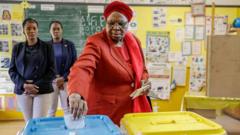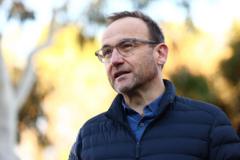Voters in Namibia are participating in an election that could usher in a new era of leadership, with female candidate Netumbo Nandi-Ndaitwah representing Swapo, amid challenges of unemployment and inequality.
Namibians Head to Polls in Pivotal Election for Leadership Change

Namibians Head to Polls in Pivotal Election for Leadership Change
Long-standing ruling party Swapo faces significant competition amid calls for change.
Voting is underway in Namibia, marking a crucial election that may be the most competitive since the country's independence from South African rule 34 years ago. Netumbo Nandi-Ndaitwah is vying to make history as the first female president of Namibia while representing the ruling South West Africa People's Organisation (Swapo), which has been in power since independence in 1990.
Nandi-Ndaitwah is running to take the mantle from Hage Geingob, who passed away in February after serving nine years. Unfortunately for Swapo, erosion of support stemming from high unemployment, persistent poverty, inequality, and corruption allegations complicates their bid for continued governance.
Her main rival, Panduleni Itula of the Independent Patriots for Change (IPC), alongside fourteen other challengers, poses a significant threat to the ruling party's authority. Voters are turning out in substantial numbers, with long queues forming at polling centers across the nation as the election began on Wednesday morning.
Polling commenced at 07:00 local time (05:00 GMT) and will remain open until 21:00. Candidates need to secure over 50% of the votes for a direct victory; otherwise, a run-off will take place between the top two candidates. Nandi-Ndaitwah, a seasoned politician with 25 years in government, cast her ballot in Windhoek, encouraging her fellow Namibians to partake in the voting process that she asserted would influence the nation’s journey for the next five years.
Itula, a former dentist and attorney who garnered 29% of the votes in the 2019 elections, emphasized the significance of the day for Namibia's democratic future as he also voted. Currently, the country is led by interim President Nangolo Mbumba, who assumed leadership after Geingob's death but is not a candidate in this election.
Analysts forecast that the preferences of young voters, who comprise more than half of the electorate, may ultimately determine the election's outcome. Alongside the presidential election, Namibians are also selecting new parliamentary representatives. With a tranquil landscape and only 3 million residents, about half of whom are eligible to vote, the stakes are high in this unfolding democratic process.
Nandi-Ndaitwah is running to take the mantle from Hage Geingob, who passed away in February after serving nine years. Unfortunately for Swapo, erosion of support stemming from high unemployment, persistent poverty, inequality, and corruption allegations complicates their bid for continued governance.
Her main rival, Panduleni Itula of the Independent Patriots for Change (IPC), alongside fourteen other challengers, poses a significant threat to the ruling party's authority. Voters are turning out in substantial numbers, with long queues forming at polling centers across the nation as the election began on Wednesday morning.
Polling commenced at 07:00 local time (05:00 GMT) and will remain open until 21:00. Candidates need to secure over 50% of the votes for a direct victory; otherwise, a run-off will take place between the top two candidates. Nandi-Ndaitwah, a seasoned politician with 25 years in government, cast her ballot in Windhoek, encouraging her fellow Namibians to partake in the voting process that she asserted would influence the nation’s journey for the next five years.
Itula, a former dentist and attorney who garnered 29% of the votes in the 2019 elections, emphasized the significance of the day for Namibia's democratic future as he also voted. Currently, the country is led by interim President Nangolo Mbumba, who assumed leadership after Geingob's death but is not a candidate in this election.
Analysts forecast that the preferences of young voters, who comprise more than half of the electorate, may ultimately determine the election's outcome. Alongside the presidential election, Namibians are also selecting new parliamentary representatives. With a tranquil landscape and only 3 million residents, about half of whom are eligible to vote, the stakes are high in this unfolding democratic process.






















